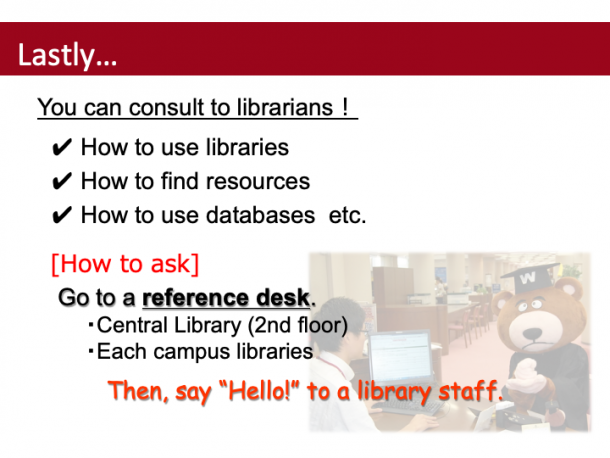CONTENTS
1. INTRODUCTION
2. FINDING BOOKS
3. FINDING JOURNAL ARTICLES
4. FINDING NEWSPAPER ARTICLES
1.INTRODUCTION
This workshop is designed mainly for fresh students of Waseda University. In this workshop, you will learn how to find and use three basic materials: Books, Journal Articles and Newspaper Articles, in academic environment which Waseda University Library provides.
—–
Have you ever think about “information” in circulation in the academic field? This is a brief summery of characteristics of “Academic Information”. Information can be changed as time proceeds, for example, newspapers have more time-sensitive but fragmentary information. On the other hand books have more time consuming and systematic knowledge. It is important to bear in mind this correlation to make your research efficiently.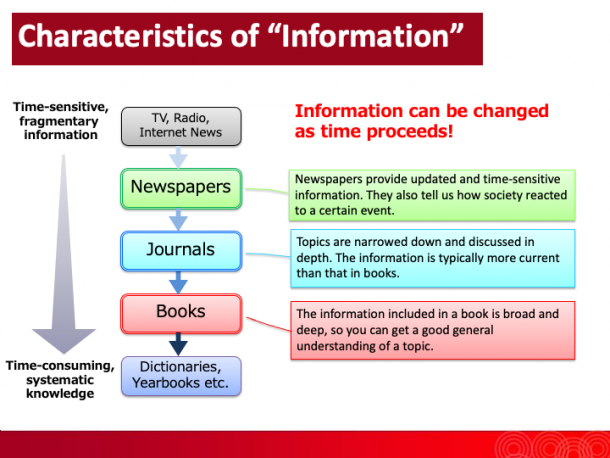
2.FINDING BOOKS
Books are good materials to start your research with. The information in books are wide and deep, so you can get a general understanding of a topic. If you don’t know how to start your research, please try books first.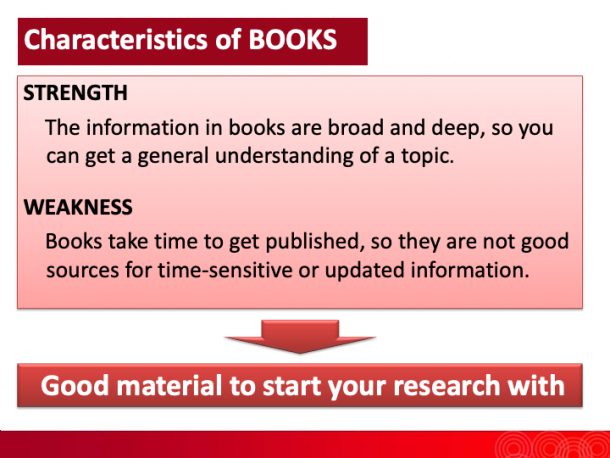
[WINE: How to Access] Please try to search books using WINE. You can access WINE from library top page easily. Select a language you use on this WEB site. [https://www.waseda.jp/library/en/]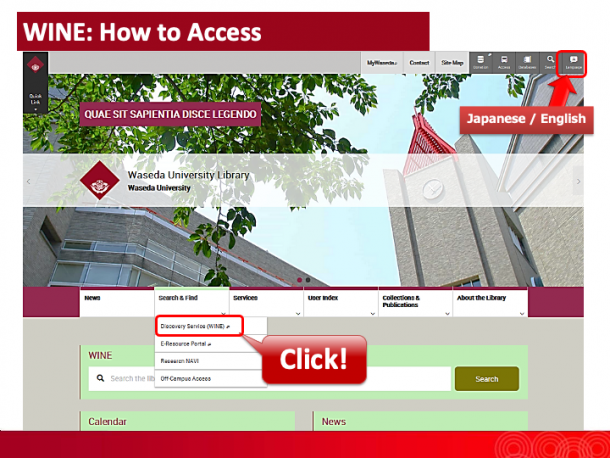
[WINE: Top Page] WINE is a discovery service of Waseda Library. You can search books, journals, journal articles and e-resources which are available in Waseda. So please use WINE as the first step for your research, as long as you are staying at Waseda as a student. Once you sign in, you can see the full search results, you can also check your records, and renew the due date of the book which you have borrowed. For further information, please see “WINE User’s Guide”. Let’s try the keyword “Japanese society”.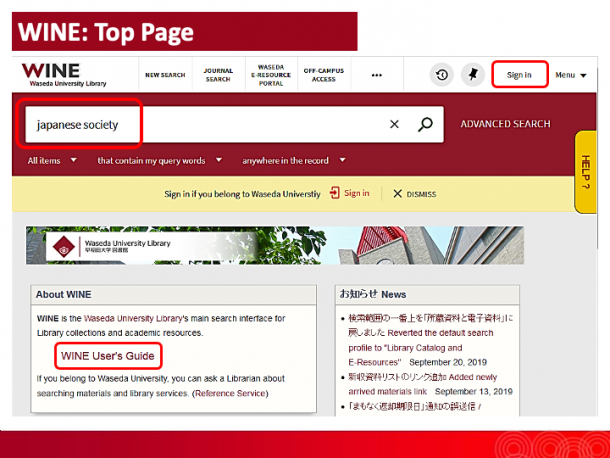
[WINE: Search Window] When you type “japanese society” in the search window, a list of retrieval range will be appeared. Since you are searching for books this time, choose “Library Catalog and E-Resources”. So you may have around 6,000 results. If you want to expand the results including articles and more, choose “Everything”. But please be noted if you choose “Everything” in this screen, you will have more than 4 million results for “japanese society”. [as of Oct. 2020]
*Actual search results might change over time. You may move forward with your results.
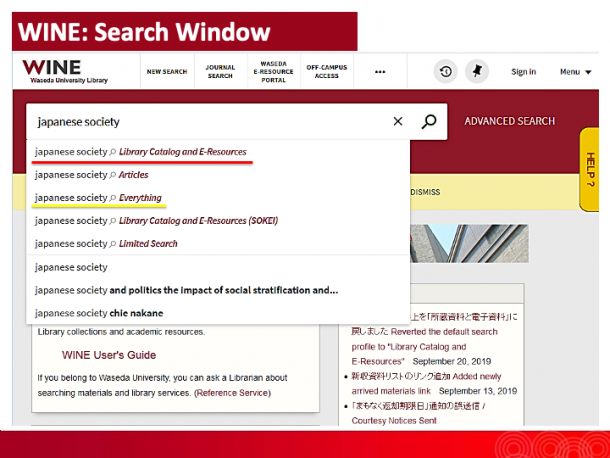
[WINE: Results 1] Now you may see the search results like this. Around six thousand is still too much to review. So try to tweak your result. First, you can sort the results by relevance, newest, oldest, title and author from “Sort by” menu on left side bar. Second, you can narrow down them by various filters of Availability, Resource Type, Language, Publish Year, etc.. So let’s see an individual information of a book, why don’t you click the book No.4 “Japanese society” by Chie Nakae.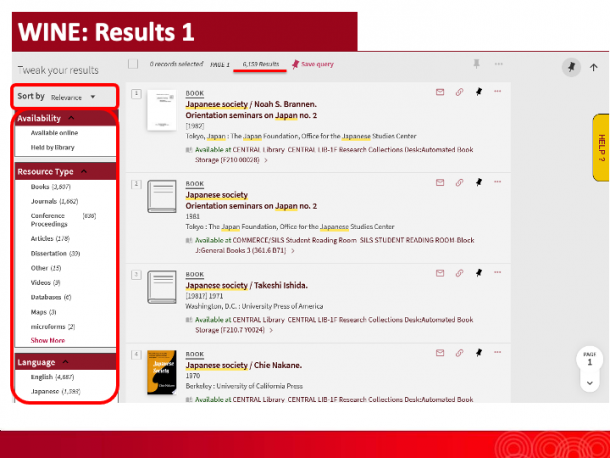
[WINE: Results 2] Then you will move to the page like this. The top part is the bibliographic information: the title, author, publisher, published year, etc. These information will be VERY important to avoid plagiarism, if you quote some sentences in your paper from this item. And location information also appears. As you may know, here are 21 libraries in Waseda, so you need to specify which library holds the actual item. In this case, same title books are owned by Central Library, Student Reading Rooms, etc. You also need to check the call No. of each item when you use one of them. For more information of each item, just click each library. The status of the book is indicated here. If it says “Available; Item in place”, it is exactly that — on the shelf. Just go there and borrow it. If it says “Out of library; On loan until **** (the due date)”, the book is being borrowed by somebody else. Simple, isn’t it? 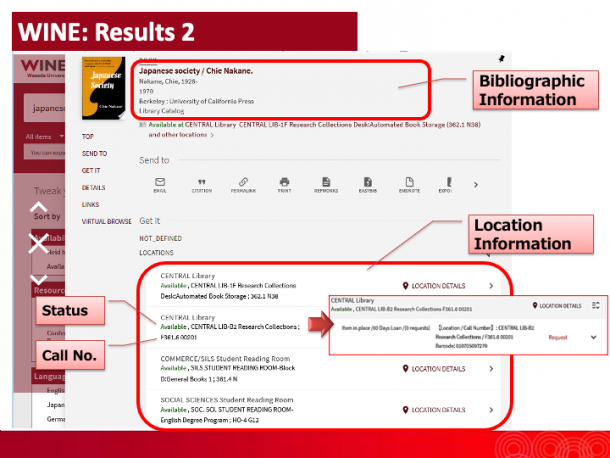
[Phrase Search] There is another efficient way to narrow down the results before you click search button; Phrase Search. Go back to the former page and type “japanese society” in double quotations. By doing this, the system will recognize the keywords as one phrase instead of separate 2 words. Without double quotations, the system will pick up every items which has “japanese” and “society”, for example; Japanese Animation in European Society. Now you see around seven hundred results.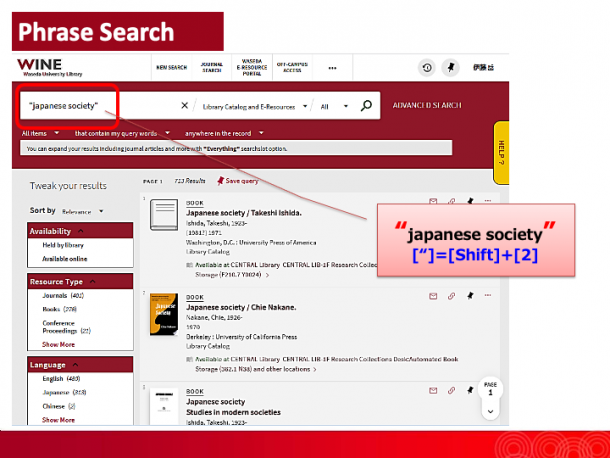
[WINE: e-book 1] Then why don’t you try to find items which can be read online, e-books. Please check “Available online” , then click Apply Filters.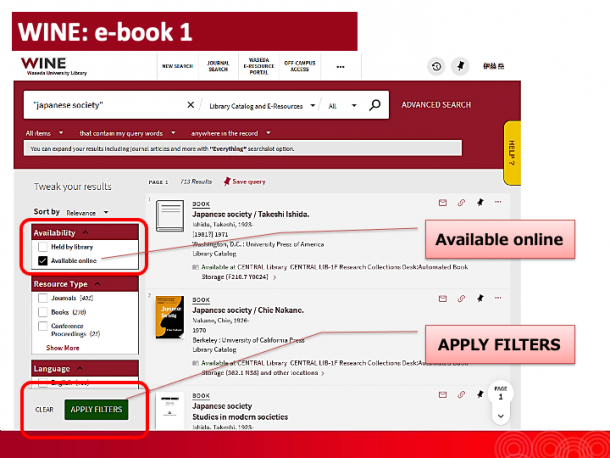
[WINE: e-book 2] Now you have a list of around four hundred e-books as a result. So please click “Interpreting Japanese Society [electronic resource]: anthropological approaches/ edited by Joy Hendry”.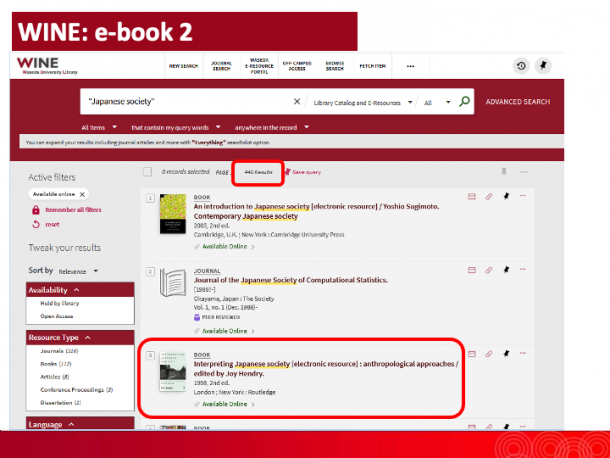
[WINE: e-book 3] By clicking “Ebook Central Academic Complete” on WINE, it will take you to the page of ProQuest. And you can use it as a PDF file. *Off-Campus Access 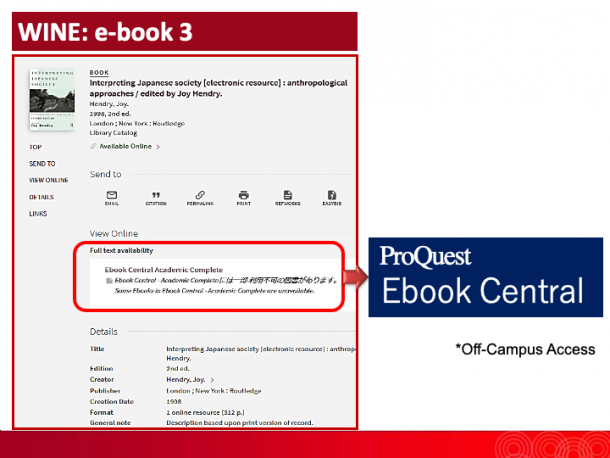
[WINE: Author Search 1] Next is author search. Let’s Go back to the top page of WINE, and try to find Murakami Haruki’s works. Put his name in the search window (“murakami haruki”, “haruki murakami”, both are OK at this time). Then choose “as auther/creator” here. 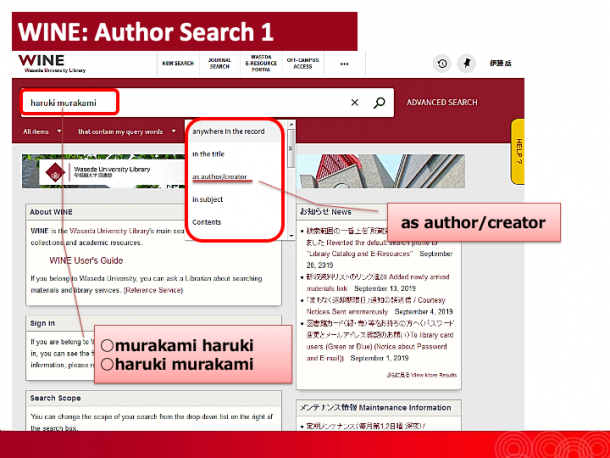
*Haruki Murakami is one of the most famous writer in Japan, and he graduated from Waseda University in 1975 .
[WINE: Author Search 2] Now you have nearly five hundred results of Haruki Murakami’s works. Then you can narrow down the results to around fifty by “language” if you want to read them translated in English. 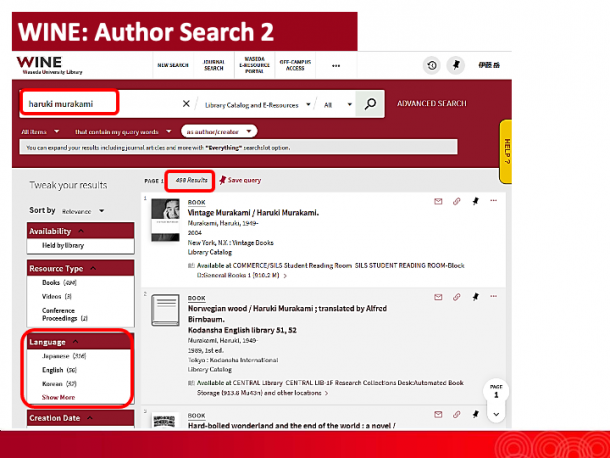
[Tips for Searching 1] These are some useful tips for searching. Sometimes you may organize your thought by these processes.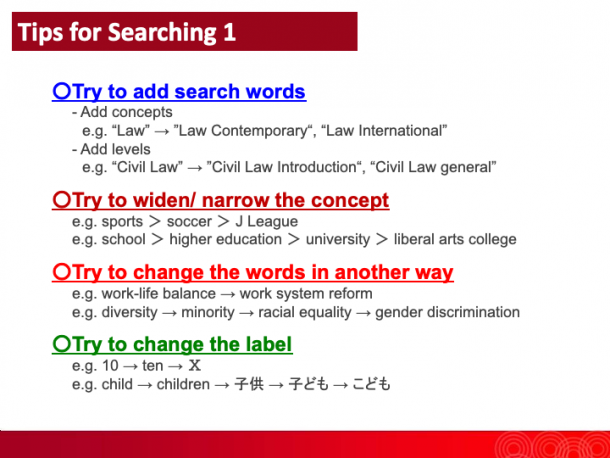
[Tips for Searching 2] This is also useful tip for searching from another point of view. We call it “imozuru-shiki” in Japanese. That means “domino effect” or “snowball effect” in English.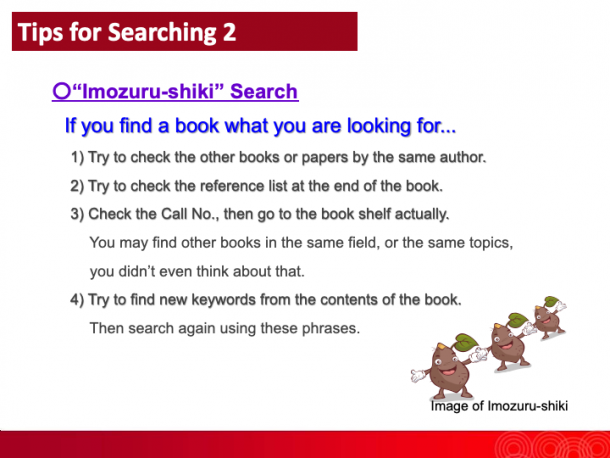
[Search for Other Institutions 1] Even if you couldn’t find the book you need at Waseda, you still have a possibility to order it from the other institution, or to visit the institution to use it. So keep on trying to search on Waseda, then Keio University, then other Japanese universities, and institutions outside of Japan.
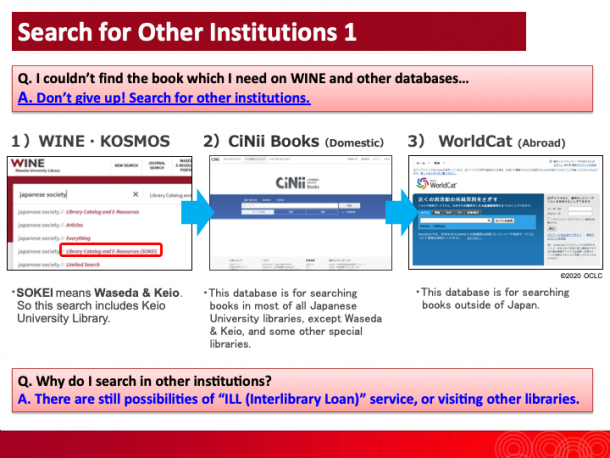
[Search for Other Institutions 2] To search other institutions, you can use the databases from Waseda E-resource Portal. They are compiled in Recommended Databases.
*Waseda E-resource Portal From this site, you can search various kind of databases which Waseda subscribes to. Many of them are actually quite expensive, but Waseda students can use them for FREE. It also has many free websites the library staff selected for students and researchers. Research Guides are also useful when you need some hints for academic search.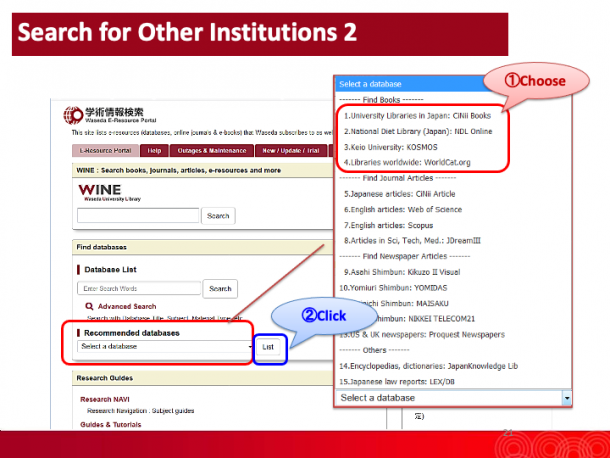
[Search for Other Institutions 3] They also can be reached from the search result of WINE like this.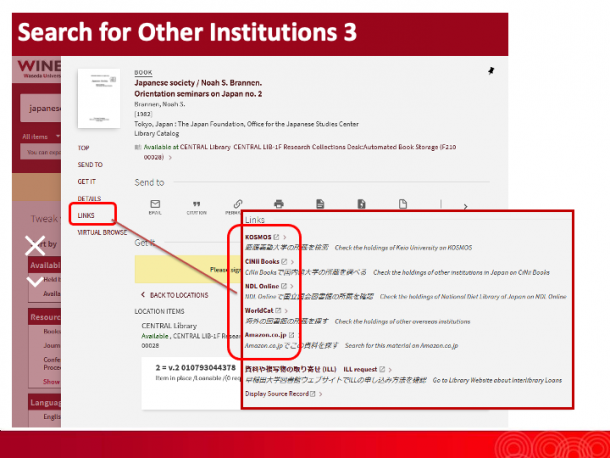
[How to Use Materials of Other Institutions] If you find materials out of Waseda, there are mainly two ways as this slide. See the ILL on the right side of this slide. ILL stands for Interlibrary Loan between libraries, and with this service, you can request a material or a partial photocopy of it from other university libraries. Also, you can can visit the library with an Introduction letter Waseda University Library issues (Please see the left side). You can apply for both service from MyWaseda (Online Requests) or ask at the Help Desk on the 2nd floor of Central library.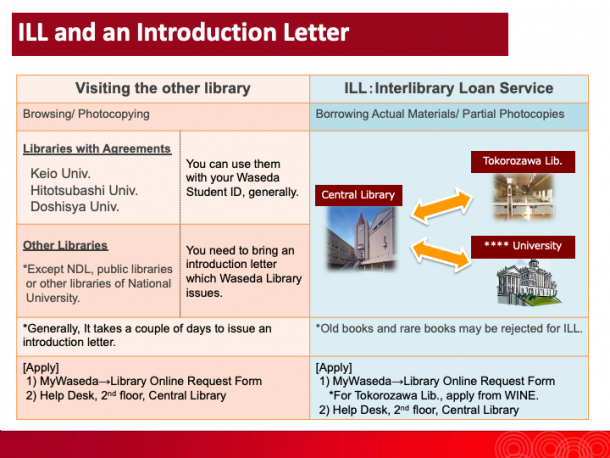
[Exercise 1] Please find books with WINE, and fill out the worksheet. Bibliographic information is VERY important to avoid plagiarism. So by filling in this worksheet, you will get familiar with making a citation list.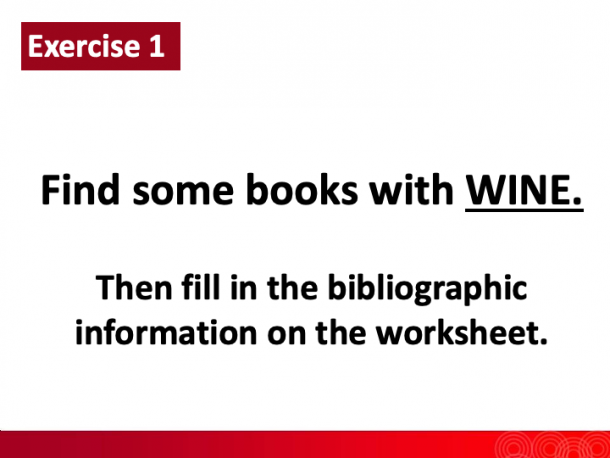
3.FINDING JOURNAL ARTICLES
Journal articles are useful once your interest in a certain topic is narrowed down. For instance, you read several books about Japanese society, and you got interested in Japanese characteristics expressed on Japanese animations, it is probably time to search for journal articles. Topics in journal articles are narrowed down and discussed in depth.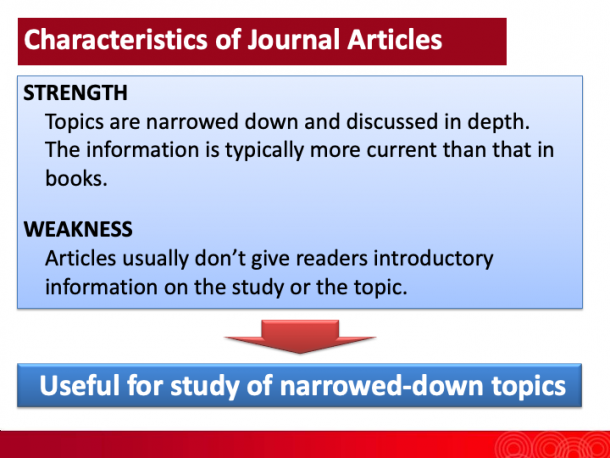
[WINE: Top Page] Let’s go back to the top page of WINE, and try the keyword “japanese society” with double quotations again. When a list of retrieval range will be appeared, choose “Articles” at this time. But please remember that this is not enough for refinement for journal articles. “Articles” includes every articles mainly journal articles. So after this search, you may have around 1 million results.
*Actual search results might change over time. You may move forward with your results.
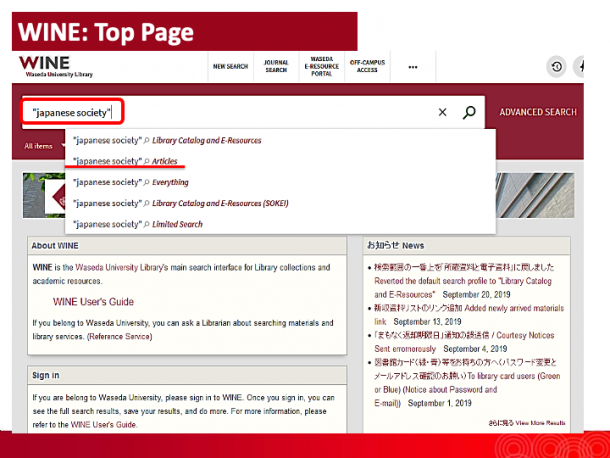
[WINE: Tweak the Results]
① Check “Available online” in Availability.
② Check “Articles” in Resource Type.
③ Choose “English” in Language.
④ Click “Apply Filters”.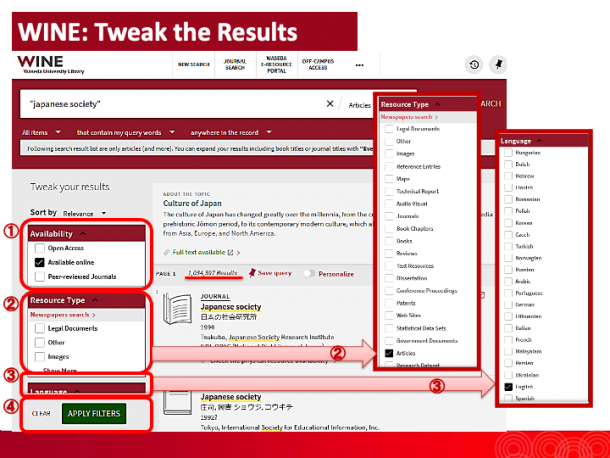
[WINE: Articles] Now you cut dawn the results to a half. Why don’t you click “Magic Shojo, and Metamorphosis”.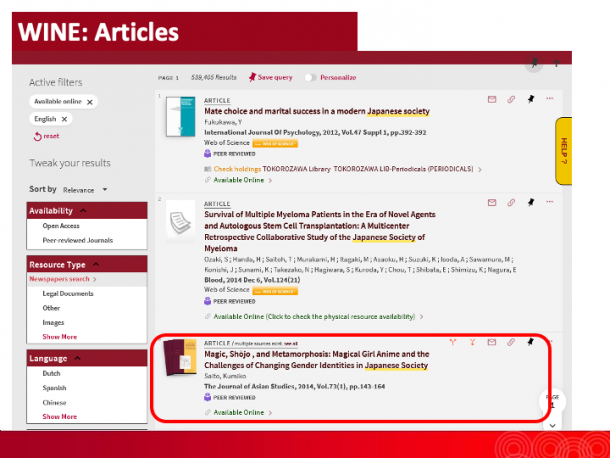
[WINE: Bibliographic Information] Don’t forget to check the bibliographic information. This article is written by Saito Kumiko, and is on The Journal of Asian Studies Vol. 73-Issue 1, page 143-164, published in 2014. As you can see, this article is available in several databases. These links will take you to websites of databases. You can view the article on HTML, or you can download the pdf file. *Off-Campus Access 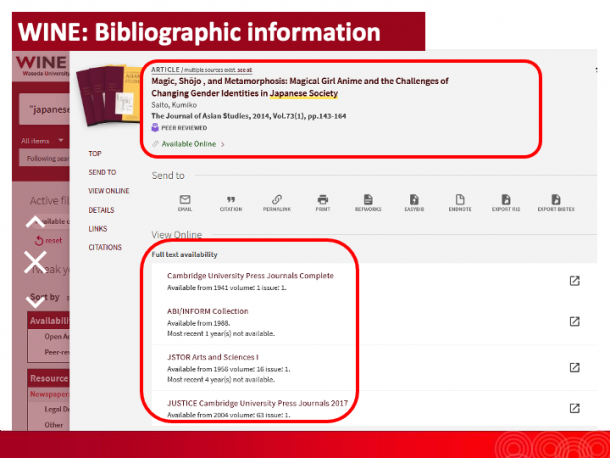
[WINE: Top Page] You can also check by WINE, if Waseda has this journal in print form. Actually Waseda own this journal but only old volumes.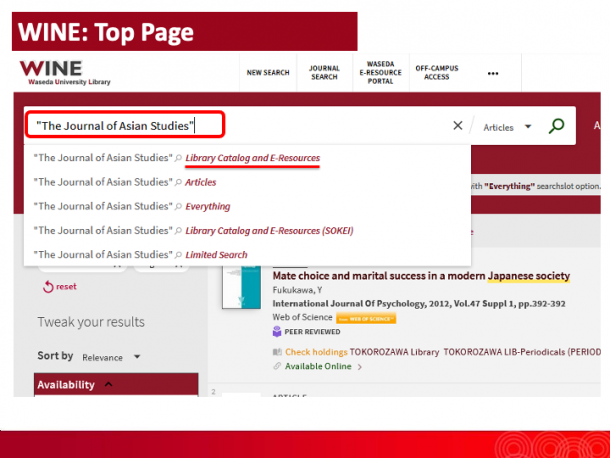
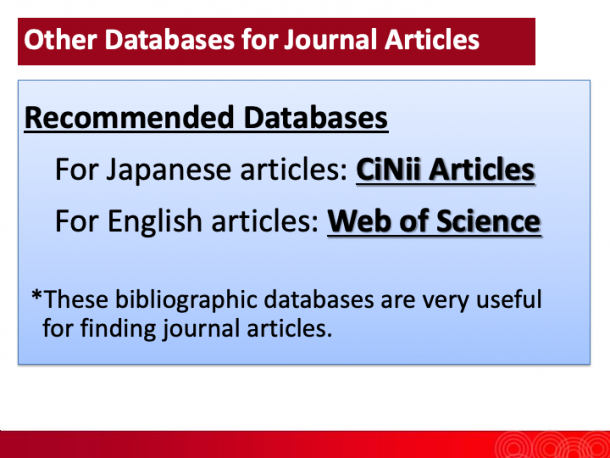
[Search for Other Institutions] They are also compiled in Recommended Databases of Waseda E-resource Portal.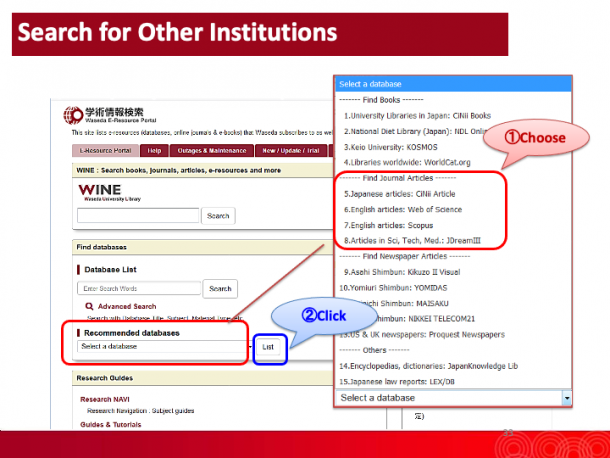
[CiNii Articles] This is the top page of CiNii Article for searching articles mainly written in Japanese.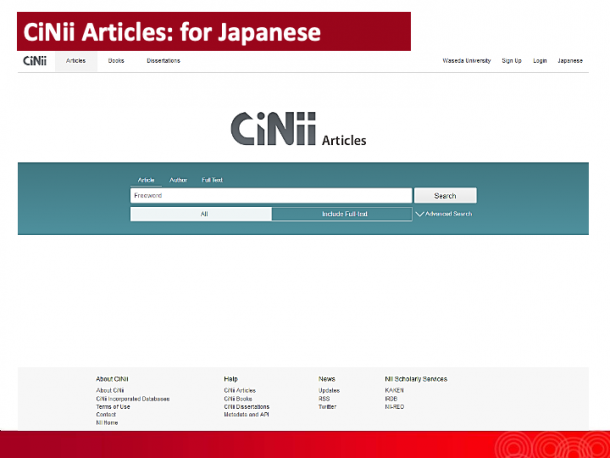
[Web of Science 1] The advantage of the Web of Science is that this database covers a wide range of academic fields. Also it has many convenient functions. Let’s go to Web of Science, and try to search with the keyword “Japanese society”.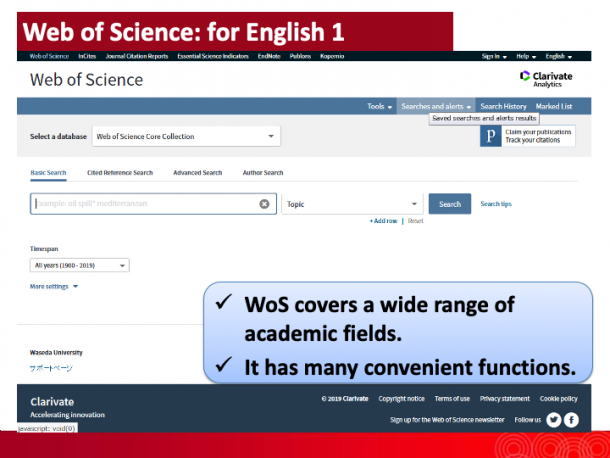
[Web of Science 2] Here is an image of the search result. You can sort the list by clicking “Times cited” menu. Then you can sort the result by the number of times the articles have been cited in descending order. More cited journal articles can be considered more important. Also, you can sort the categories from left side menu. Web of Science may be easier than the other databases to use if you are not used to search for journal articles.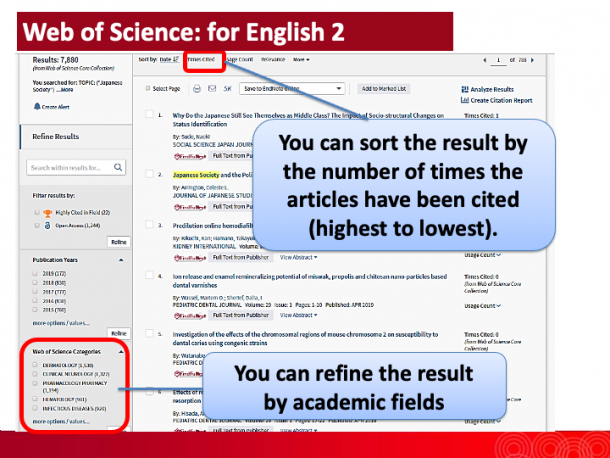
[Web of Science 3] The bibliographic information of each article are also shown like this. Web of Science itself basically doesn’t have the full-text data of articles. What this website provides you with is the bibliographic information of articles like WINE. So, basically, after you find the article you want to read with Web of Science, you have to check to see if the article is available in Waseda. If you find the “Find Fulltext” button under the bibliographic information, click the button, and the system automatically checks to see if the article can be read in the electronic journals Waseda subscribes to. If the article cannot be read online, try WINE to see if the paper edition is available at Waseda.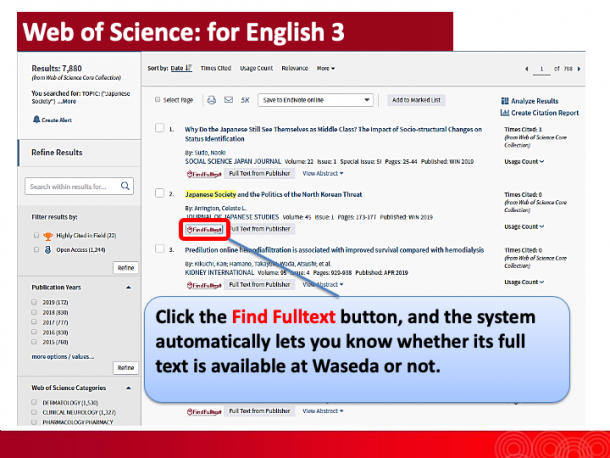
[Exercise 2] Please find journal articles with WINE or Web of Science, and fill out the worksheet. 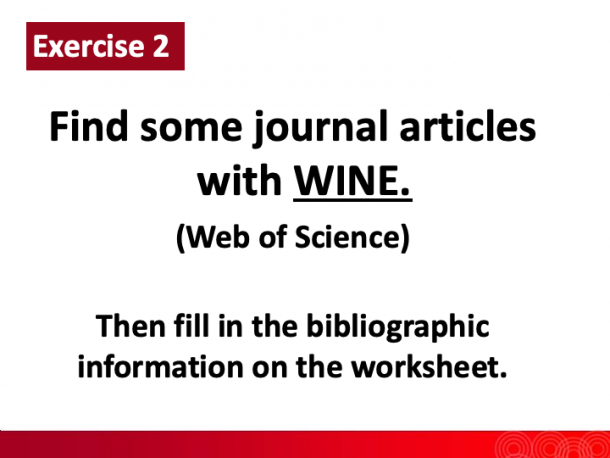
4.FINDING NEWSPAPER ARTICLES
Newspaper articles are not as fundamental as books or journal articles for academic papers, but they cover information that academic books or journals don’t cover. They provide us with time-sensitive information, also let us know how society reacted to a certain event. If you want to use this sort of information, please refer to newspapers. 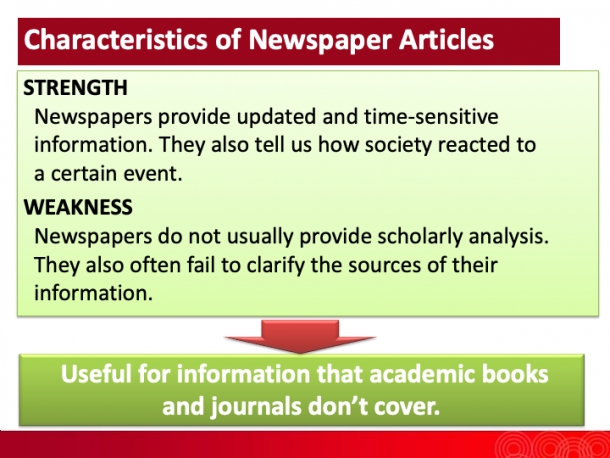
[Research Navigation] You can read many newspapers on the 3rd floor of Central Library, not only of Japanese newspapers but also from all over the world. In addition to that, many newspaper articles can be searched by databases Waseda subscribes to. You can also find them from the “Recommended Databases”. They also can be accessed by “Research NAVI”. This function is useful too, so please click Research NAVI this time.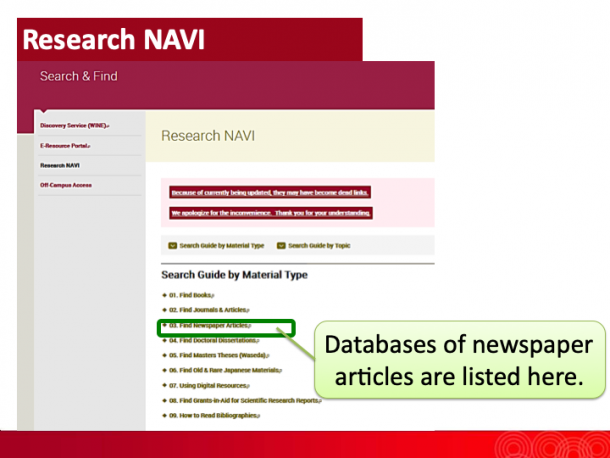
In Research NAVI, The guides are categorized by material types and topics. What you have learned the books and journal articles in this guide can be reviewed here, too. Click “03. Find Newspaper Articles” so you can see the list of the newspaper databases and the links to them.
[Newspaper Articles Databases] Waseda subscribes to the databases of Japanese major newspapers such as Asahi, Yomiuri, Nikkei, and Mainichi., and also many newspapers from all over the world. You will learn 2 of them in this guide. *Off-Campus Access 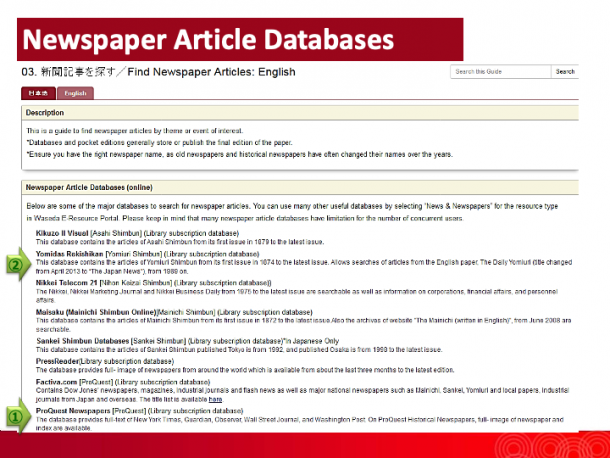
[ProQuest Newspapers] If you want to read English newspaper articles, ProQuest Newspapers is highly recommended. It includes 5 English major newspapers: The New York Times, The Guardian, The Observer, The Wall Street Journal, and The Washington Post. *Off-Campus Access 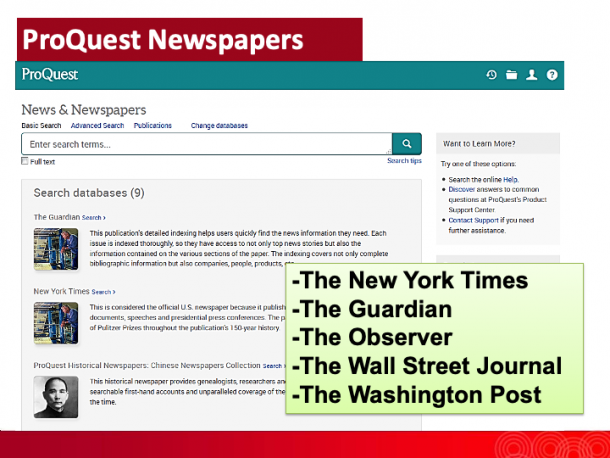
[Yomidas Rekishikan] If you are looking for the newspaper articles about Japan written in English, please use Yomidas Rekishikan. It is a database of Yomiuri newspapers. Click a tab which says “The Japan News.” *Off-Campus Access 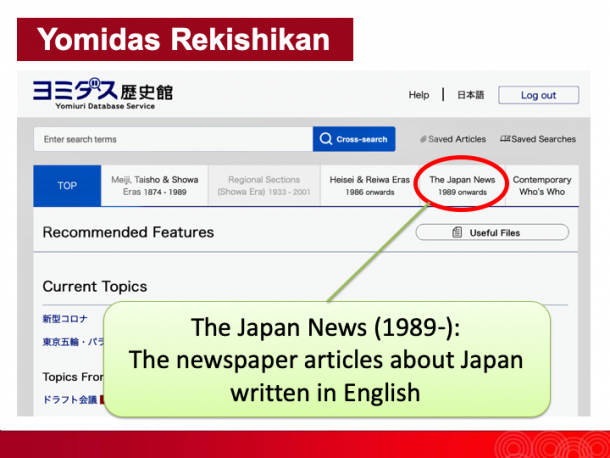
[WINE: Newspaper Articles] You can search English newspaper articles from WINE selecting NEWSPAPER SEARCH like this.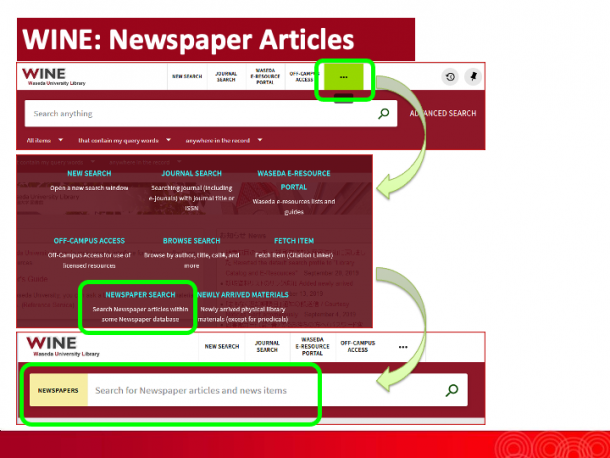
[NOTICE] There are some databases which don’t limit the number of users, such as ProQuest newspapers, CiNii Books, CiNii articles, Web of science etc. But please keep in mind that some expensive databases have limitation for the number of users. The number of limitation is written on each guide page.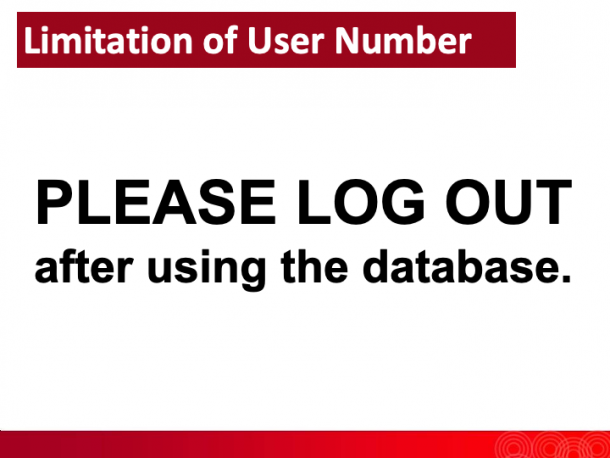
[Exercise 2] Please search ProQuest Newspapers or Yomoidas Rekishikan for newspaper articles, and fill out the worksheet. 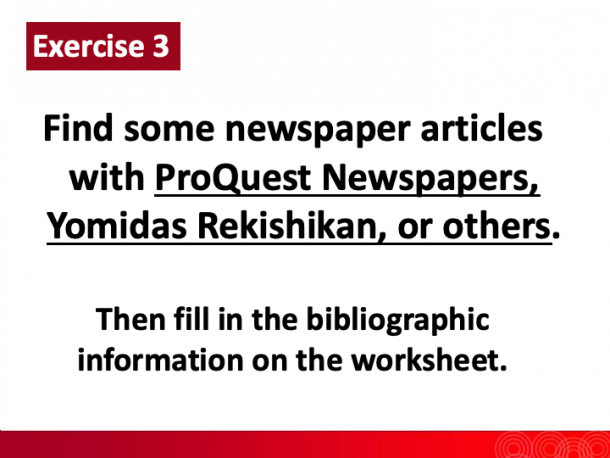
Thank you for reading this guide. We hope this guide will help your study at Waseda.
If you have any questions, please feel free to visit. Library staff will support you face to face. *References Services